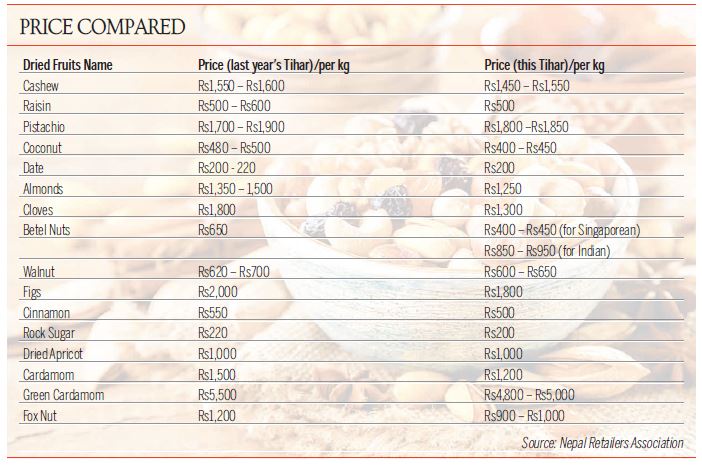Money
Prices of dried fruits remain stable in run-up to Tihar
Wholesale traders said there were few chances of prices going up from current levels.
Krishana Prasain
The usual rise in prices of dried fruits in the run-up to Tihar has not happened this year due to abundant inventory and subdued demand, traders said.
Sales of popular dried fruits like cashew, raisin, pistachio and coconut are expected to plunge by 40 percent, said Raj Kumar Shrestha, president of the Nepal Retailers Association.
“Merchants are holding unsold stocks remaining since the Covid-19 pandemic hit the country. And rather than let the inventory rot in their storerooms, they hope to clear it by selling it at a reasonable price during the festive season,” he said.
Packets of the nutritious nuts, seeds and other items are given as gifts by women to their brothers during the ceremonies, and sales soar this time of the year.
But with the coronavirus caseload showing no signs of abating, a cloud hangs over the celebrations; and shopkeepers expect business to improve if prices do not increase.
Wholesale traders said there were few chances of prices going up from current levels.
Devendra Bhakta Shrestha, president of the Nepal Wholesalers Association, said demand for dried fruits saw a sharp decline this year. “We used to get inundated by demand from traders outside the valley too,” he said.
Dried fruit shops reopened after remaining closed for four to five months after the government allowed stores dealing in daily essential items to resume business. Besides Tihar, demand for dried fruits surges during the wedding season.
Most of these social events have been cancelled; and with sweet shops, hotels, restaurants and cafes only reopening recently, demand for dried fruits is still slow.
Moreover, people were concerned more about stocking up on essential foods during the pandemic, and they did not want to spend money on extras like dried fruits when incomes had gone down, Shrestha said.
Most of the people who used to travel to their homes outside the valley during Dashain would return and celebrate Tihar here, and that pushed up demand for dried fruits. But this year, with Covid-19 cases increasing in the valley, most of those who went to their hometowns have not returned, and so traders expect a fall in business.
“Tihar is a week away, and I don’t think prices will go up from what they are now,” Shrestha said.
As the purchasing capacity has declined, and there are fewer shoppers on the market streets of Asan, Indra Chowk and Makhan Galli on New Road where dried fruits worth millions used to be sold during the festival, sellers are not excited about the business this year, he said.
According to the association, Tihar accounts for 40 percent of the annual sales of dried fruits. Wholesale traders also say that prices will not go up as there is no reason why they should increase.
Sales of dried fruits jump fourfold during Tihar mainly due to the tradition of giving them as ‘Bhai Masala’ by sisters to their brothers. Dried fruits such as cashew, raisin, pistachio, coconut, date, almond, clove, betel nut, walnut, fig, cinnamon, cardamom and fox nut and rock sugar are the main ingredients in the Bhai Masala package.
According to the association, cashews that cost Rs1,550 to Rs1,600 per kg during Tihar last year are priced at Rs1,450 to Rs1,550 this year.
Pistachio which cost Rs1,700 to Rs1,900 per kg last year is being sold for Rs1,800 to Rs1,850 this year.
Most dried fruits sold in Kathmandu are imported from India, Pakistan, China, the United States, Australia and other countries.





 9.83°C Kathmandu
9.83°C Kathmandu















